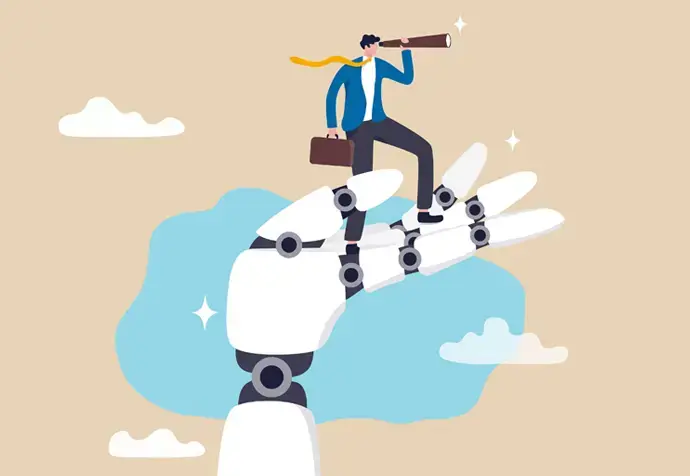The landscape of IT managed services is evolving at an undeniable clip. There was a time when a tech wizard could keep things afloat with a couple of pieces of specialized hardware, an oversized box of cables, and a lot of coffee. Today, as the complexities of managing IT services grow, we look to a different kind of wizardry – the kind involving artificial intelligence. At GroupOne IT, we’re looking at all the possible ways that AI could help us with our daily tasks. AI is not about replacing humans in the workspace; it's about enhancing the capabilities of IT professionals and businesses. Here's a list highlighting the top 8 ways we’re researching and testing AI for productivity improvements.
1. Streamlining Ticket Management
AI tools can now ‘understand’ and categorize incoming support tickets based on their content, urgency, and past service records. Imagine a system that automatically routes tickets to the right department without any human intervention or errors. This immediate categorization and prioritization can cut down on resolution time significantly, avoiding any bottlenecks that would generally clog traditional ticket systems.
It's crucial to stress that AI should be used in connection with humans, not in replacement of humans. AI shines brightest when it helps IT support specialists focus their human skills on the most important problems facing their clients.
2. Intelligent Documentation
Documentation is often the unsung hero of IT support, providing the roadmap for all future troubleshooting and fixes. We’re looking at ways for generative AI to make this process smarter by providing intelligent suggestions and auto-generation features for helpdesk documentation.
AI tools can capture interactions from resolved tickets, learn from previous troubleshooting steps, and aggregate this knowledge into a dynamic repository that is continuously updated and expanded. This living documentation not only accelerates the troubleshooting process by making information more accessible but also serves as a knowledge-sharing platform for the entire IT support team.
3. Rapid Diagnostics Through AI Analytics
At the forefront of IT concerns lies the need for rapid, accurate diagnostics. AI has the potential capability to analyze vast amounts of data quickly, pinpointing issues and offering possible solutions based on historical patterns and best practices. Combining AI analytics with human expertise can result in a comprehensive service that delivers efficiency and accuracy at a level not previously attainable.
To illustrate, AI’s role would be to flag potential issues. Human IT specialists would then decipher these flags, apply context and strategic thinking to each identified problem, and provide a tailored solution that goes beyond the automated system's capabilities.
4. Predictive Maintenance
One of AI’s most potent tools is looking into the future – and this could be especially helpful in predictive maintenance. By analyzing trends and historical performance metrics, AI could detect issues long before they happen, allowing for scheduled preventative maintenance that minimizes system downtime. We know that more uptime of servers, ERP systems and equipment directly correlates to more money for your business.
5. Proactive Cybersecurity Measures
Cybersecurity remains a top priority for GroupOne IT and our clients. AI can excel at monitoring network behavior and identifying potential risks. It could be the silent guard that spots anomalies and unusual patterns that might signal an impending security breach.
Yet, the importance of the human touch cannot be understated. IT professionals need to interpret these AI-generated insights to form a comprehensive security strategy that not only stops a current breach but also defends against future ones.
6. Accelerated Training and Development
As we look to integrate AI into IT service provisioning, it will become crucial to ensure that teams are adept at working with these technologies. AI can facilitate training and development by creating simulations, suggesting learning modules, and automating skill assessments.
This could result in faster onboarding of new tools and technologies, as well as continuous professional development for the IT team, keeping their skills up-to-date and in alignment with the evolving technology landscape.
7. Automation of Repetitive Tasks
The automation capabilities AI brings to the table are a game-changer. Routine tasks such as data entry, software updates, and network configurations that can monopolize human hours could be managed by AI, leaving IT specialists the time to focus on strategic, high-impact activities.
AI cannot replace the intricate knowledge or adaptability of a human IT specialist. It's the nuanced, sophisticated tasks that really require a human touch, which leads to a more satisfied client.
8. Data-Driven Business Decisions
AI's ability to sift through and analyze big data can help MSPs make better, data-informed business decisions. With AI-generated insights, businesses can leverage their resources more effectively, pinpoint growth areas, and streamline processes for maximum profitability.
Generative AI is indeed a technology that could redefine IT management, but the last and most critical point to take away is this: AI is a tool, a powerful tool, but a tool nonetheless. In the IT realm, AI should always supplement and support the capabilities of the human workforce. After all, IT’s human touch remains the most vital component in ensuring that the sophisticated interplay of tech and services is orchestrated successfully.


